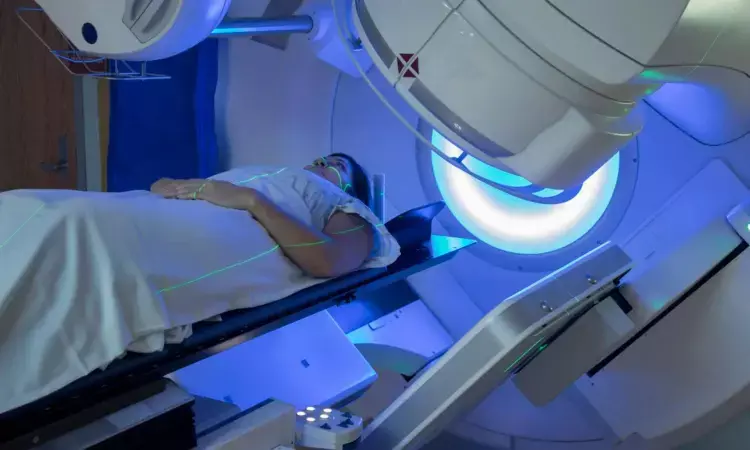- Home
- Medical news & Guidelines
- Anesthesiology
- Cardiology and CTVS
- Critical Care
- Dentistry
- Dermatology
- Diabetes and Endocrinology
- ENT
- Gastroenterology
- Medicine
- Nephrology
- Neurology
- Obstretics-Gynaecology
- Oncology
- Ophthalmology
- Orthopaedics
- Pediatrics-Neonatology
- Psychiatry
- Pulmonology
- Radiology
- Surgery
- Urology
- Laboratory Medicine
- Diet
- Nursing
- Paramedical
- Physiotherapy
- Health news
- Fact Check
- Bone Health Fact Check
- Brain Health Fact Check
- Cancer Related Fact Check
- Child Care Fact Check
- Dental and oral health fact check
- Diabetes and metabolic health fact check
- Diet and Nutrition Fact Check
- Eye and ENT Care Fact Check
- Fitness fact check
- Gut health fact check
- Heart health fact check
- Kidney health fact check
- Medical education fact check
- Men's health fact check
- Respiratory fact check
- Skin and hair care fact check
- Vaccine and Immunization fact check
- Women's health fact check
- AYUSH
- State News
- Andaman and Nicobar Islands
- Andhra Pradesh
- Arunachal Pradesh
- Assam
- Bihar
- Chandigarh
- Chattisgarh
- Dadra and Nagar Haveli
- Daman and Diu
- Delhi
- Goa
- Gujarat
- Haryana
- Himachal Pradesh
- Jammu & Kashmir
- Jharkhand
- Karnataka
- Kerala
- Ladakh
- Lakshadweep
- Madhya Pradesh
- Maharashtra
- Manipur
- Meghalaya
- Mizoram
- Nagaland
- Odisha
- Puducherry
- Punjab
- Rajasthan
- Sikkim
- Tamil Nadu
- Telangana
- Tripura
- Uttar Pradesh
- Uttrakhand
- West Bengal
- Medical Education
- Industry
Among locally advanced breast cancer patients, PET-CT detects more distant metastases

Canada: A recent study revealed the detection of more distant metastases with PET-CT than conventional staging in patients with locally advanced breast cancer (LABC), and also, fewer PET-CT patients received combined modality therapy.
The study, published in the Journal of Clinical Oncology, highlights the potential of PET-CT in improving staging accuracy and guiding appropriate treatment decisions for patients with locally advanced breast cancer.
● The trial involved 369 patients with invasive ductal carcinoma of the breast and TNM stage III or IIb. Participants were randomized into two groups: PET-CT and conventional staging. In the PET-CT group, 23% of patients were upstaged to stage IV breast cancer, compared to 11% in the conventional staging group.
● This difference in upstaging resulted in treatment changes for 81.3% of the upstaged PET-CT patients and 95.2% of the upstaged conventionally scanned patients.
● The study revealed that patients upstaged to stage IV breast cancer would benefit from avoiding the toxicity and adverse effects associated with aggressive combined modality therapy when the disease is incurable.
● Among patients in the PET-CT group, 81% received combined modality treatment, while 89.2% of conventionally staged patients received the same treatment. This difference suggests a potential reduction in overtreatment for patients upstaged by PET-CT.
● The study analyzed subsets of patients based on various factors. Among patients without inflammatory breast cancer, PET-CT upstaged 23% of patients, compared to 10% in the conventional staging group.
● For patients with estrogen receptor (ER)-positive disease, PET-CT was particularly sensitive in detecting asymptomatic stage IV disease. It was also sensitive, though to a lesser extent, for upstaging ER-negative and HER2-positive breast cancers reported Mark N. Levine, MD, MSc, of McMaster University in Hamilton, Ontario, and colleagues.
The trial raises several unanswered questions, including whether withholding multimodality therapy in patients with no clear evidence of distant metastases on conventional imaging but apparent disease on PET-CT may impact long-term outcomes. Identifying patients with limited metastatic disease who may still have a chance of cure remains a critical question.
While FDG PET-CT increases the diagnosis of de novo oligometastatic stage IV breast cancer in locally advanced cases, the optimal management of this type of cancer remains uncertain. The results of this study support the consideration of PET-CT for staging patients with clinical stage IIb (T3N0) and stage III breast cancer. The findings provide valuable evidence for implementing PET-CT in clinical practice and its impact on treatment decisions for locally advanced breast cancer patients.
The randomized trial comparing PET-CT with conventional staging for locally advanced breast cancer demonstrates that PET-CT leads to the detection of more distant metastases
and reduces the number of patients receiving combined modality therapy. The study highlights the potential of PET-CT in improving staging accuracy and optimizing treatment decisions, particularly for patients with limited metastatic disease who may benefit from a different treatment approach. Further research and long-term follow-up are needed to understand the impact of PET-CT on patient outcomes fully.
Reference:
Journal of Clinical Oncology Dayes IS, et al "Impact of18F-labeled fluorodeoxyglucose positron emission tomography-computed tomography versus conventional staging in patients with locally advanced breast cancer" J Clin Oncol 2023; DOI: 10.1200/JCO.23.00249.
Dr Kamal Kant Kohli-MBBS, DTCD- a chest specialist with more than 30 years of practice and a flair for writing clinical articles, Dr Kamal Kant Kohli joined Medical Dialogues as a Chief Editor of Medical News. Besides writing articles, as an editor, he proofreads and verifies all the medical content published on Medical Dialogues including those coming from journals, studies,medical conferences,guidelines etc. Email: drkohli@medicaldialogues.in. Contact no. 011-43720751


